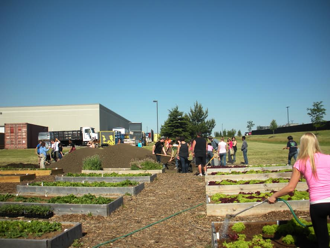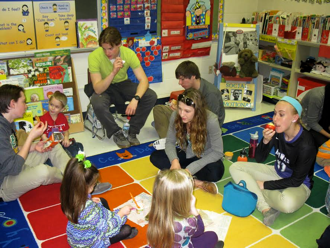Harborside Academy is a grade 6-12 charter school in Kenosha, Wisconsin with a joint focus on character and academics. The school is guided by the Expeditionary Learning (EL) model which combines rigorous academic content and real world projects, or learning expeditions, with active learning and community service. One of the learning expeditions at Harborside, Food and Justice for All, has been especially impactful for the students and community they serve.
Over the last 15 years, Kenosha has suffered the loss of several manufacturing businesses. These losses have left many Kenoshans jobless and struggling to make ends meet, including providing healthy food for their families. Of the 600 students enrolled at Harborside Academy, forty percent qualify for free or reduced price meals. Food access and security are very real concerns for the citizens of Kenosha.
In 2008, Mark Dirr, an executive with XTEN Industries (a plastics manufacturer in Kenosha), came to a Harborside parent information meeting and presented environmental science teacher Mary Bohning with a business card and an offer: 5 acres of vacant land adjacent to XTEN Industries. Ms. Bohning envisioned turning the land into a community garden where she could teach her students about where the food they eat comes from. After sharing this idea with XTEN Industries the company offered Ms. Bohning and her students to use the land for free. And with that, the Food and Justice for All expedition was born.
The Food and Justice for All program began in earnest in 2010 with five raised beds and guidance from Gateway Technical College Horticulture mentors. The premise was simple: create awareness around food security issues, especially in Kenosha and Kenosha County, and connect students to the land where their food comes from. Since then, the program has taken off thanks to support from community partners (e.g., Kenosha Common Market, City of Kenosha, University of Wisconsin Extension educators, and local nonprofits, to name a few) and grant funding.
In 2011, Harborside Academy received a $19,154 grant to expand the program to three elementary schools. Using this grant funding, students from Harborside built, filled, and planted the first 16 beds at the schools. In 2012, Harborside students worked with Carthage College students to prepare a State Farm grant proposal. The students were awarded $70,000 from State Farm, and the funding was used to purchase gardening equipment and to expand the garden to the full 5 acres donated by XTEN Industries. Other grants include: a $2000 Healthy Classrooms grant to acquire aquaculture kits and $367,000 from Transform Wisconsin to plant raised beds at 21 more elementary schools in the Kenosha Unified School District.
The Food and Justice for All curriculum is spread across numerous subjects and prepares the students for work in the garden and in the community. Students in government classes learn about food legislation, regulations, and government subsidies; math classes cover calculations related to land use and harvest; and in English classes, students read books such as Michael Pollan’s In Defense of Food. Additional topics that are covered include past and current agricultural practices, soil ecology, food security, water issues, and nutrition.
Outside the classroom, students spend time tending to the garden; running a booth at the Saturday Farmers’ Market; designing curricula around healthy food for elementary schools in high poverty neighborhoods; and mentoring elementary school students whose schools are participating in the program. Students also work with teachers and community partners to educate families about how to grow, prepare, and cook their own food. The students’ impact on the community has been huge: in just three growing seasons, four tons of food have been harvested and donated to local food pantries. Their efforts have helped feed thousands of their neighbors and other school children.

And their hard work has not gone unnoticed. The Food and Justice for All program has received local, state, and national recognition for its student service-learning component. Students have been invited to speak at several national conferences to educators and their peers about their experiences. In 2013, Ms. Bohning was named Kenosha Unified School District’s first ever Innovative Educator of the Year for her groundbreaking work in empowering students to address food security issues in their own backyard.
The Food and Justice for All program continues to make an impact for the Kenosha community. The current garden includes 43 raised beds and trellis systems for 800 tomato plants, and produces roughly one and a half tons of fruits and vegetables per year. Ms. Bohning anticipates expanding the program to the remaining elementary schools in the Kenosha Unified School District and encouraging the use of sustainable practices by the students, both in and outside of the gardens.

